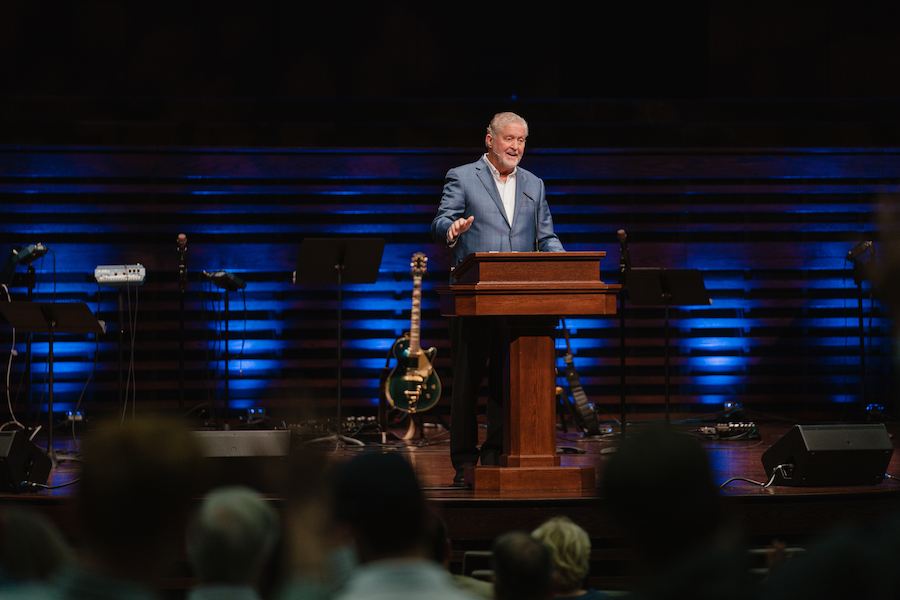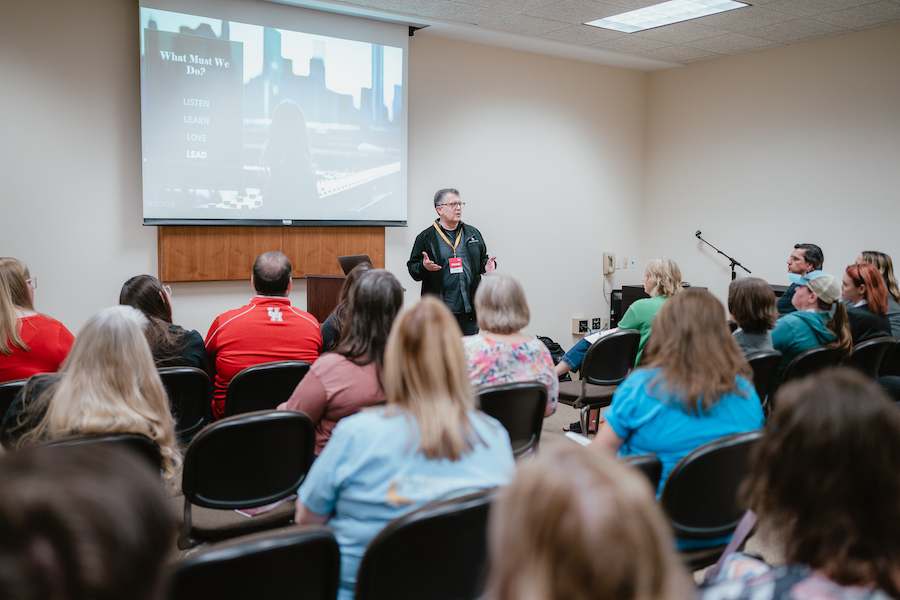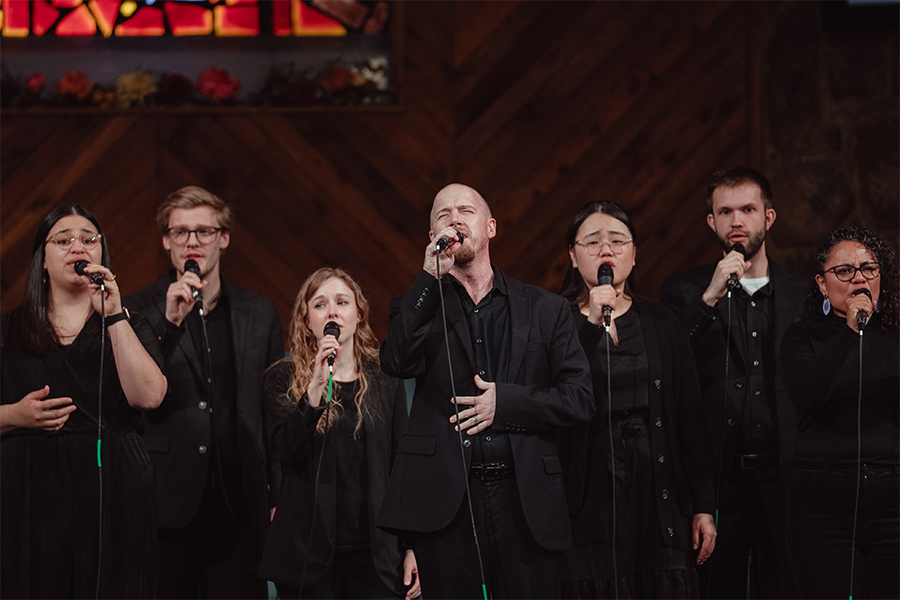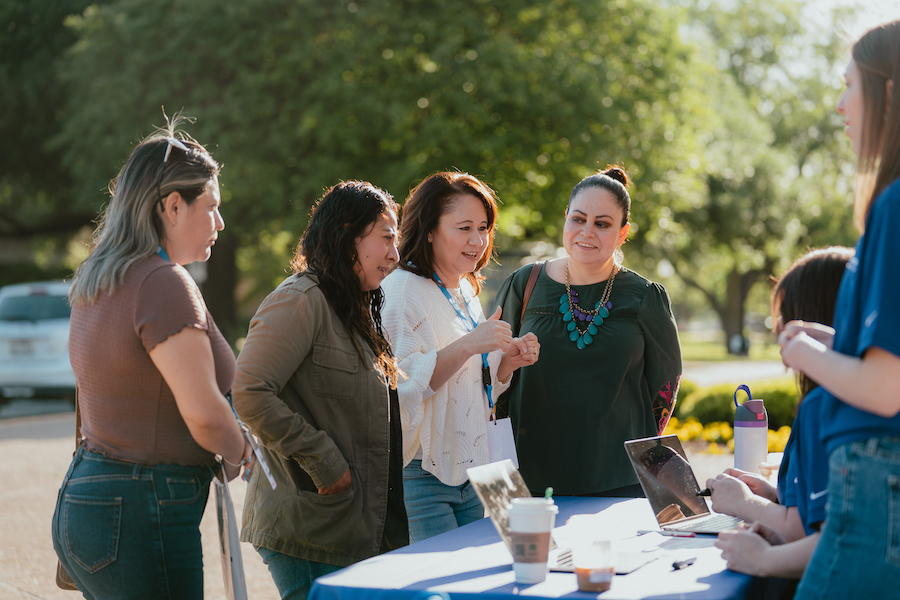Denison encourages students to engage culture amid tsunami of moral change


In his September 7 chapel message at Southwestern Baptist Theological Seminary, cultural apologist Jim Denison encouraged the school’s students, faculty, and staff to engage the culture by ultimately and always leading unbelievers to Jesus.
In his introduction of Denison, founder and chief vision officer of the Denison Forum on Truth and Culture, Southwestern Seminary and Texas Baptist College President Adam W. Greenway said the day was one he had “looked forward to for some time” as he welcomed the 1983 Master of Divinity and 1989 Doctor of Philosophy graduate back to the campus. Denison previously served on the faculty of Southwestern Seminary and has pastored three Southern Baptist churches, most recently being Park Cities Baptist Church in Dallas.
“Everything significant about my life and service was molded and formed and transformed through the years here,” Denison told the gathered assembly. “To be back here now … it’s such a privilege, and I just am so very honored to be here.”
Citing opinion surveys that show 67 percent of Americans support same sex marriage, 76 percent of American millennials say “truth is what they believe it to be” and only 24 percent of Americans believe the Bible is the literal Word of God, Denison said the church is “facing a cultural tsunami unprecedented in American history” as “evangelical conservative Christians are facing a rising tide of opposition that is unprecedented in our nation’s history.”
In speaking of the “cultural tsunami” taking place in America today, Denison explained tsunamis occur from unseen underwater earthquakes that produce the massive water event.
“I’d like to explain the earthquakes that are causing the tsunami because I believe that tsunami, as it were, characterizes your kingdom assignment, characterizes the culture you are assigned to reach, not just for this day, but I think for our lifetime,” said Denison before naming the four successive earthquakes in America today.
Naming the first earthquake as “the denial of biblical truth for objective truth,” Denison said for today’s “postmodern relativistic culture” there is “no such thing as absolute truth.”
“Everybody knows that tolerance is the key value,” Denison commented on society’s perspective of biblical truth. “As long as you’re sincere in your beliefs and tolerant of mine, we’ll get along. The Bible is a diary of religious experience.Doesn’t matter what you believe, so long as you’re sincere and tolerant. That’s our culture.”
The first earthquake leads to the second earthquake of a denial of biblical morality.
Noting the recently passed “heartbeat bill” in the state of Texas that does not allow for an abortion after detection of a fetal heartbeat, Denison said the thought today is “my body is mine to do with as I wish from abortion, euthanasia, sexual orientation, gender identity, [and the] Equality Act.”
This leads, Denison said, to the third earthquake that “Christians are repressors.”
Denison pointed the congregation to critical theory, a theory that arose in Germany in the 1920s and 30s that is a “Marxist kind of idea that says we experience life in classes, oppressive classes, oppressed classes. If you are prosperous, it is because by definition, somewhere along the way, your class has oppressed somebody else, some other class to achieve where you are by definition.”
Using the theory’s definition, Denison noted, “If you’re a majority class … you’re an oppressive class. Well, Christians are the majority on some level in this culture … so by definition you’re oppressors.”
The fourth earthquake is “a rising radical secularism known as replacement ideology,” Denison said. He said this thought believes “whatever your view of truth is … that’s your authenticity. And if I disagree, I am dangerous.”
“There was a day when the church was central to culture; then in the 60s and 70s, it becomes peripheral to culture,” Denison explained. “Now it is dangerous.”
Directing the congregation to Acts 17:16-32 and Paul’s encounter of the men of Athens who were worshiping idols at Mars Hill, Denison noted Paul was “in a situation similar to ours” before he outlined five steps to engage today’s culture.
Denison said believers should first take initiative. Citing Paul’s example of going to the synagogue and marketplace to reason with the people, Denison said, “We go down; we don’t wait on them to come down. We go to them.”
Denison encouraged the assembly to have a personal Acts 1:8 strategy that includes being a witness right where God has them.
Additionally, believers should “seize the opportunity” God has given them, Denison said as he observed Paul’s example of engaging the elite of his day.
“If you will start everyday by being filled with the Spirit, by being led by the Spirit, He will open doors for you” that they do not yet see, Denison said.
Denison explained believers should build common ground with those with whom they are sharing by starting “where people are.”
“Start where they hurt, start with the need,” Denison explained. “You can meet and earn the right to meet the need, they don’t perhaps even recognize.”
Denison said commonality, the fourth way to engage culture, was evidenced by Paul as he reasoned with the men of Athens “in a Socratic sense, using Aristotelian syllogistic logic” while also quoting their philosophers of the day.
Finally, Denison encouraged the attendees to “lead always to Jesus.”
“Ultimately, you’re leading them to Jesus,” Denison said as he concluded his message. “And then if you will do that, if you’ll start everyday surrendering to the Spirit, volunteering for duty, engaging this tsunami like culture, taking the initiative, seizing the opportunity, building commonality, utilizing accepted authority, leading to Jesus, then leave the result to Him.”
The entire sermon can be viewed here.
Chapel is held every Tuesday and Thursday morning at 10 a.m. (CT) in MacGorman Chapel on the campus of Southwestern Seminary. Chapel may be viewed live at swbts.edu/live.



